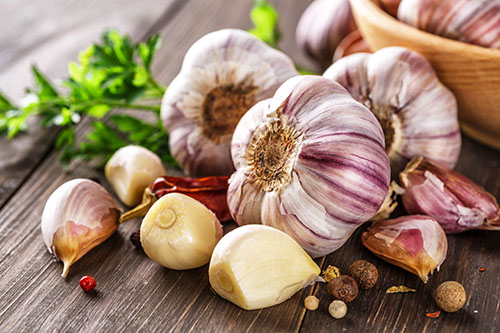UT Extension to Host Tennessee Garlic Production Workshops
Apr 23, 2024

Extension agents and specialists from the University of Tennessee Department of Agricultural and Resource Economics and Department of Plant Sciences are offering educational workshops on garlic production for commercial producers across the state. The Tennessee Garlic Fest workshops begin in July and will include presentations on production and economic considerations and feature a panel discussion of producers of the specialty crop.
Interest in garlic production is on the rise, given the versatile nature of the crop, which can be grown in urban settings, on a smaller footprint, or easily integrated into diversified vegetable farm operations. Garlic workshops offered in 2023 were well attended across the state, and organizers expect attendance to grow.
There is no cost to attend, but preregistration is required one week in advance of each workshop. Lunch will not be provided, but food trucks will be available onsite. The Garlic Fests will be held from 9 a.m.–2 p.m. local time on the following dates and locations:
Check your local Co-op to purchase products to help with the planting and harvesting of garlic bulbs, as well as other vegetables and flowers. We offer sets of bulbs in packs of 50, 100, or 250. Many of our locations also offer 5-pound or 50-pound bags of garlic mineral salt or 44-pound mineral salt blocks mixed with garlic to administer fly repellant in an extremely convenient method of summer pest control. Organic bags and blocks are also available. These garlic mineral salt supplements can be used for beef and dairy cattle, sheep, goats, swine, and poultry. Studies show that they can reduce fly counts by about 55% and significantly reduce cattle avoidance behaviors, improving the health of your animals.
For more content like this, check out the latest issue of The Cooperator.
Interest in garlic production is on the rise, given the versatile nature of the crop, which can be grown in urban settings, on a smaller footprint, or easily integrated into diversified vegetable farm operations. Garlic workshops offered in 2023 were well attended across the state, and organizers expect attendance to grow.
There is no cost to attend, but preregistration is required one week in advance of each workshop. Lunch will not be provided, but food trucks will be available onsite. The Garlic Fests will be held from 9 a.m.–2 p.m. local time on the following dates and locations:
- July 26 — UT Extension Fentress County office — 3553 S. York Hwy, Jamestown, Tennessee 38556
- August 23 — Ron Ramsey Regional Agricultural Center — 140 Spurgeon Lane, Blountville, Tennessee 37167
- September 24 — AgriCenter International campus, Hospitality Suite — 105 S. Germantown Pkwy, Cordova, Tennessee 38018
Check your local Co-op to purchase products to help with the planting and harvesting of garlic bulbs, as well as other vegetables and flowers. We offer sets of bulbs in packs of 50, 100, or 250. Many of our locations also offer 5-pound or 50-pound bags of garlic mineral salt or 44-pound mineral salt blocks mixed with garlic to administer fly repellant in an extremely convenient method of summer pest control. Organic bags and blocks are also available. These garlic mineral salt supplements can be used for beef and dairy cattle, sheep, goats, swine, and poultry. Studies show that they can reduce fly counts by about 55% and significantly reduce cattle avoidance behaviors, improving the health of your animals.
For more content like this, check out the latest issue of The Cooperator.